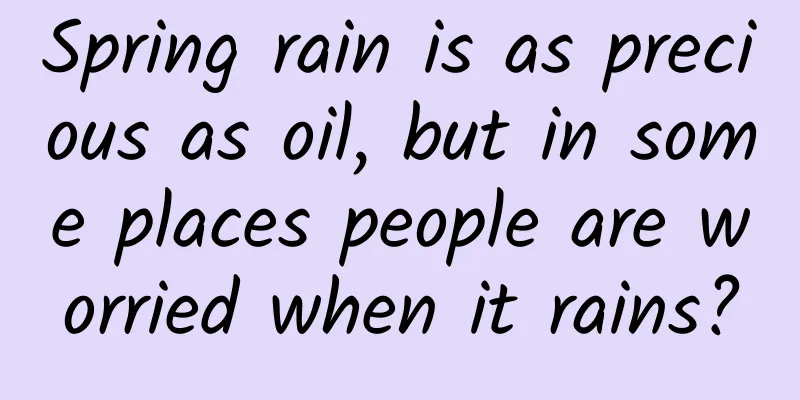Spring rain is as precious as oil, but in some places people are worried when it rains?

|
"Spring rain is as precious as oil" is a familiar agricultural proverb, which may have originated from "Spring rain is like ointment". According to Zuo Zhuan, in the 19th year of Duke Xiang of Lu, when Ji Wuzi of Lu was sent to Jin to thank it for sending troops to help, he said, "Small countries look up to big countries, just like hundreds of grains look up to ointment rain. If it is ointed regularly, the whole world will be in harmony, not just my poor city." "Spring rain is like ointment" describes that spring rain can nourish crops like ointment. For example, in the Song Dynasty's "Zhizhi Collection" and "Yuan Shixuan", there is "Spring rain is like ointment for 30,000 miles, and everyone will cheer for the reign of Emperor Yao." Later, it was transformed into the agricultural proverb "Spring rain is as precious as oil". For example, Li Guangting of the Qing Dynasty said in "Xiangyan Jieyi" that "Spring rain is as precious as oil, ointment rain". "Spring rain is as precious as oil" is mainly popular in North China, where "nine out of ten springs are dry". Because the water demand of winter wheat increases sharply after jointing in April, but there is little spring rain in North China, so the people call it "neck-strangling drought". The yield of wheat fields without irrigation is almost proportional to the rainfall, "rain means food", and spring rain is as precious as oil. In fact, the timely rain during the spring drought in North China is not only "ointment", "oil", but also "gold". There is a passage in "Xie Xueshi Shihua" from the Ming Dynasty: The king saw that it rained in March (in the lunar calendar), and summoned Xie Jin to ask: "How much is this rain worth?" Xie Jin replied: "The jade steps of the wall and courtyard are wet, and the ground is deep. Ask me how much it is worth? The ground is full of gold." However, further north, in the northeast, spring rain is not always "oil". In the spring and summer of 1967, I was sent to Gannan County in Nenjiang District, Heilongjiang Province, to summarize the weather forecast experience of Lv He, the branch secretary of Taiping Brigade and a national model worker, who "grows crops by looking at the sky and the earth". Because the grain output of his brigade was nearly twice as high as that of the surrounding areas on average. As soon as the author arrived at the place, he heard the second half of the sentence "Spring rain is as precious as oil" followed by "Too much and I will be worried." It turns out that although the western Heilongjiang region also experiences drought in spring, the temperature is relatively low in spring because of the local latitude to the north. Therefore, too little spring rain will certainly reduce production due to drought, but too much spring rain will cause the impact of spring cold to be more serious than spring drought. Therefore, the main contradiction affecting local grain production is no longer spring drought but spring cold. Because if there are too many rainy days in spring and the temperature is low, the underground frozen soil will melt slowly, and the seeds will not germinate; even if they germinate, they will grow and develop slowly. When the crops are about to mature in autumn, they will be hit by frost and the harvest will be very poor. Therefore, it is said that "too much spring rain will cause worries." In agricultural meteorology, this disaster caused by the delay of the growth period of crops is called "delayed cold damage." The success of Lv He's experience lies in his ability to roughly and correctly predict the rainfall and temperature during the critical growth period of spring crops based on the meteorological conditions in the late winter and early spring, mainly the frequency of rainy easterly winds, so as to reasonably arrange crops and varieties and maximize the best harvest. For example, in years with more spring rain, a variety of low-temperature and moisture-resistant soybeans are planted, and although the yield is relatively low, the harvest can be guaranteed; while in years with less spring rain, a variety of high-yield crops such as sorghum and corn that like warmth and tolerate drought are planted. In other words, Lv He tried his best to make the spring rain "oil" rather than "worry" in this area where the climate is very sensitive to the impact of crop yields. There is something even more bizarre in my country’s northwest region: in that place where water is as precious as gold, people actually “worry” when spring rain falls! It turns out that farmland in arid areas mainly relies on water from melted ice and snow in high mountains for irrigation. Even if it rains occasionally in spring, the rainfall is usually very small, only wetting the ground for a while, and has little effect on crops. However, this little rain is often enough to form a hard crust on the surface of the local saline-alkali soil, and the tender seedlings cannot even break through the soil. In agricultural meteorology, this is called "rain damage" to crops. Therefore, when spring rain falls here, people often have to immediately organize manpower to loosen the soil, and sometimes even have to sow again. How can people not worry and be anxious? The late Vice President of the Chinese Academy of Sciences, Zhu Kezhen, also said in his "Travels in Xinjiang" that in the arid climate, "Xinjiang farmers do not want cloudy and rainy days, but sunny days (so that the ice and snow in the mountains can melt (in large quantities)." This is also the reason. Because Xinjiang is an irrigated agriculture, cloudy days will reduce the amount of ice and snow melted in the mountains. In fact, if you think about it carefully, the same is true for North China. It's just that the "threshold" of spring rain that causes the contradiction to transform is much higher than that of Heilongjiang. For example, in the spring of 1964, there was a lot of spring rain in North China. Although winter wheat production did not decrease due to low temperatures, it was due to the excessively humid climate that caused severe wheat rust, resulting in a significant reduction in production. It's just that such years are extremely rare, so they don't become "worrying" in people's minds. It can be seen that in different time and space, resources and disasters are relative and can be transformed into each other. It mainly depends on whether the increase or decrease of rainfall exceeds a certain degree, and whether the quantitative change leads to qualitative change. For example, the spring rain in the northern part of Heilongjiang in Northeast China often transforms between "oil" and "worry". For another example, in the Jiangnan region of my country, where there is the most spring rain in a large area, "rains fall heavily during the Qingming Festival", and the spring rain is so much that it even causes the early rice seedlings to rot and need to be replanted; in the early 1980s, I was invited to participate in the scientific expedition to the Hengduan Mountain area of the Chinese Academy of Sciences Comprehensive Examination Committee, and I went to the Dulongjiang Commune in the northwest of Yunnan. Because there is an additional topographic spring rain season, the climate is so humid that only years with very little spring rain can get a good harvest. However, even in the same time and space, the benefits and harms of spring rain can be completely different. For example, according to records, Emperor Taizong of Tang once asked Xu Jingzong: "I think you are the most virtuous among all the ministers, (but) some people say you are not good, why is that? Jingzong replied: "Spring rain is like cream, farmers like its moisture, pedestrians hate its mud; the world is so big that it cannot satisfy people's wishes, let alone ministers..." As Xu Jingzong said, spring rain, which is like cream and oil for farmland, became a disadvantage for pedestrians on muddy streets in ancient times. For example, Xie Jin of the Ming Dynasty once slipped on the street after the spring rain. Perhaps his appearance was funny and people who saw him laughed. Xie Jin was so angry that he chanted a poem "Spring Rain" to vent his anger. The poem says: "The spring rain is as slippery as oil, and it flows all over the street; Xie scholar fell down, and laughed to death a group of cows." Source: Popular Science Times Author: Lin Zhiguang, researcher at the Chinese Academy of Meteorological Sciences Image source: unsplash Editor: Mao Mengnan Review: Wang Fei Final judge: Chen Lei |
<<: How long would it take to dig through the Earth?
Recommend
The "Song of the 24 Solar Terms" actually has eight lines, and you may not have sung all of them.
The beginning of winter has just passed, which me...
A review of the top 10 most popular marketing events in 2018
Alipay Koi, Yang Chaoyue from "Produce 101&q...
What is it like to be you?
Leviathan Press: When we talk about character, we...
How to place advertisements on Toutiao?
How to place ads on Toutiao? Advertising Process ...
Do you know what is a healthy weight for a person? Regardless of gender, read this...
Who said that? Who says you need to lose weight! ...
Social media acquisition: How to get old users to help you promote your products?
Human nature is often the driving force behind ma...
What are the similarities and differences between Huawei and ZTE, both of which have been banned by the US government?
On the eve of May 17 Telecom Day, the Bureau of I...
Private Domain Traffic Operation and Construction Strategy
If we compare private domain traffic to a fish po...
Five major mobile application development trends, is your app going astray?
Developers cannot ignore mobile app development i...
Apple in the post-Steve Jobs era: More users but fewer fans
Emotional communication between brands and fans r...
Academician Zhong Kang: The evolutionary history of crop breeding: from wild domestication to intelligent design
Editor's note: General Secretary Xi Jinping p...
Is it expensive to join the Harbin flash sale mini program? Harbin Seckill Mini Program Franchise Fees and Process
What is the price to join the Harbin flash sale m...
How to operate Tiktok with a novice hand, and earn US dollars from 0 to 10,000 followers in 3 days
So today such a course comes out! Course Catalog:...
Official reminder! Be careful when eating this kind of rice noodles recently, as it may cause death!
Expert of this article: Fu Shufang, Master of Foo...
What kind of river is the Tarim River? Learn more in this article →
“Tarim River, the river of my hometown, how many ...









